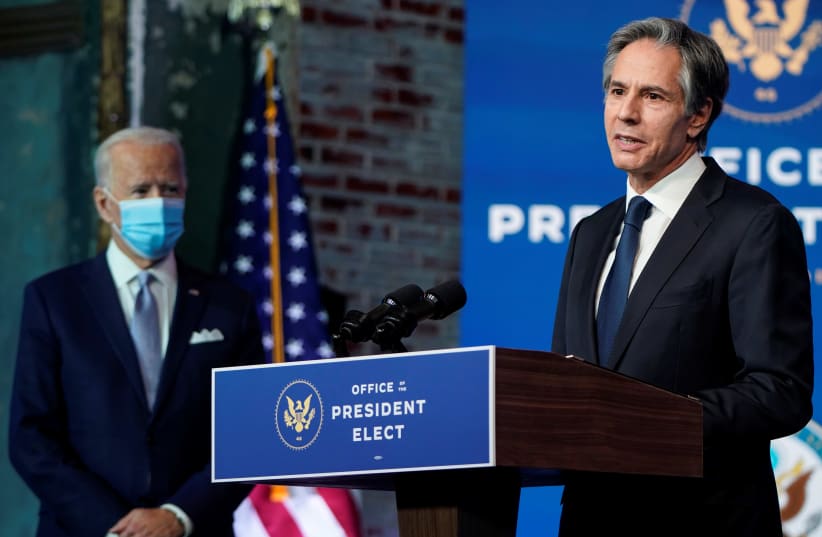Using almost identical language, both incoming Director of National Intelligence Avril Haines and incoming Secretary of State Anthony Blinken said that the Biden administration wanted to rejoin the deal, but was "a long way" away from that.
Both officials expressed vehement and unqualified opposition to Iran getting a nuclear bomb – and both cited a need to somehow reign in the Islamic Republic's ballistic missile program and its destabilizing of the Middle East.
All of this was music to the ears of Israel and moderate Sunni states, and particularly significant from Haines, whose views on the next steps forward with Iran were considered more up-in-the-air.
With Tehran recently increasing its uranium enrichment to the medium 20% level and threatening to kick out International Atomic Energy Agency inspectors on February 21, there was fear in the region that the Biden administration might be bullied into rejoining the deal precipitously.
The two incoming officials who will have a major impact on Iran policy seemed to blow this out of the water.
Less clear is whether they intended "a long way" to mean they will not rush to cut a deal before Iran's June 2021 elections, at which time many analysts assume that anti-diplomacy hardliners will replace the administration of Iran President Hassan Rouhani.
There was some other good news for Israel and the moderate Sunnis.
Blinken did not merely say he opposed the ayatollahs getting a nuclear bomb, but twice stated the US would prevent them from getting to the uranium enrichment threshold for a bomb.
This puts down clear benchmarks which color future Biden administration policy.
When officials only talk about stopping Iran from getting a nuclear bomb, they could mean allowing it to enrich enough uranium for a weapon, but being willing to step in at a later date before it completes certain weaponization, detonation and delivery tasks.
Blinken's multiple statements seem to clarify that Biden would stop Iran at the earlier stage to ensure it does not even get to the point of enough enriched uranium for a bomb.
That was the end though of the good news.
THE INCOMING secretary of state was pretty explicit that as long as Iran is not foolish and does not over demand, Biden will return to the 2015 deal in exchange for its returning to the deal's nuclear limitations, and without asking for upfront concessions on the additional issues of ballistic missile testing and Iran's regional behavior.
Israeli officials have opposed a return to the deal, but have asked that at least any return be conditioned on new, upfront concessions by Iran.
They say that this is simple negotiations 101: once the US relieves sanctions, what incentive would Iran have to offer new concessions? It will only have that incentive as long as some sanctions are hanging over its head.
Here, Blinken's statements could leave some room for leverage.
One scenario analysts have discussed would be a general declaration of both sides returning, but with a delayed sequencing of US sanctions being lifted only incrementally and spread out over time to ensure maintaining leverage.
Incoming Biden officials have also said that America’s unilateral sanctions snapback during the Trump administration showed that they could continue to hold such a snapback over the Islamic Republic as an authentic threat if it did not later agree to new concessions.
They also say that the sanctions snapback they could wield as a threat might be stronger because they will bring the EU back onto America's side in the nuclear standoff, after four years in which Trump-EU fights bizarrely seemed to shift the Europeans more into Tehran's orbit.
Whether Biden's team could pull off getting concessions from Iran after already starting the process to return to the deal will remain an open question, and no Biden officials have made clear that they would seek to extend the nuclear limits beyond 2030, maybe the most crucial issue for Israel and moderate Sunni states.
This could also be a point of internal conflict within the administration. Some, like Blinken, are seen as closer to Israel, and might push for using a gradual sanctions-lifting process to sneak in some concessions from Iran – while his main deputy Wendy Sherman, incoming environmental czar John Kerry and others whose names are on the 2015 deal, might be more likely to push for returning even if there are fewer concessions.
Still, the future conflict likely to take place between the Biden administration and Israel on the Iran issue was symbolized by Blinken's colorful language that they would advise with regional players "at liftoff" of the negotiations, but not necessarily on the final terms "at landing."
But at least in the meantime, the concern of some Israeli officials – that there would be a sudden return to the deal without any process in place for obtaining new concessions from Iran – appears to be off the table.
